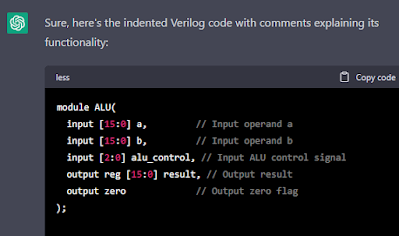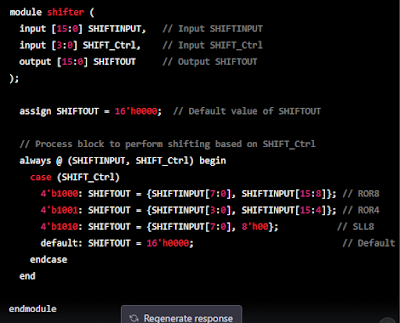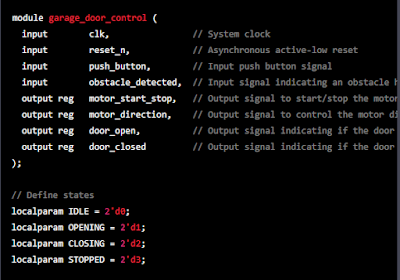A month ago, I heard about ChatGPT. I wanted to know how it will create Verilog RTL code. When I got to log in from their waitlist, I tried asking simple questions. I was impressed by the ability to spit out pretty clean and well-documented Verilog code. In this article, I'm documenting my brief experimentation with ChatGPT, results, and comments to provide a balanced picture.
Here is a shameless plug. All these questions discussed here are taken from my interview questions blog page. Check it out at rajesh52.blogspot.com . I have almost 47 questions listed about ASIC/FPGA's front-end design. All these questions require some thinking and awareness about ASIC design flow and physical implementation understanding.
I have conducted many interviews in the last 25 years of my career. I rarely find anybody giving a completely satisfactory answer to arbiter design questions. So I decided to pose that question first. I was surprised to get a solution that made sense on the surface. I did not check for the accuracy of the answer yet, but it made sense.
OK. Some progress, but it ignored my synchronizing prompt. I am quickly losing faith in the "I" part of AI.
This question is about synchronization, and later mentioning unrelated frequencies leads to the importance of Async FIFOs. ChatGPT behaved like a rookie Intern who is fast and confident but stupid. If the solution is available in the public domain, it can copy and present but lacks originality in problem-solving.
It discovered the functionality. The port list comments are better than the original.
Here are further comments
I am really impressed. This is a well-known function/component in open source. I agree. I set up my expectation lower. Maybe I secretly wanted ChatGPT to shine this time :)
I tried one more interesting task. Converting VHDL to Verilog.
I asked it to convert the Shifter VHDL code from this page.
https://www.fpga4student.com/2017/07/shifter-design-in-vhdl.html
I am really impressed. I won't trust it and will prefer to write a test bench to ensure the intention is correct, but the seemingly quality of the code is impressive.
Now I wanted to test its ability to generate test benches. First, I asked it to create a well-known Garage door opener design.
It spits out lengthy code.
Now I have warmed up to ChatGPT and almost started to believe it.
It provided a long nice looking test bench.
And then it did this.
Two initial statements running different tests and assigning values independently to the same variable. Nah, I lost confidence again. I can not trust ChatGPT to provide me trustworthy code. It acts like a very confident liar. You never know when you are getting duped.
I asked to rewrite the test bench in UVM. It gave a pretty elaborate test bench. I am not a UVM expert, so I won't comment on the correctness of testbench, but the sheer ability to spit out a test bench for a given module gives a jump start in writing a test bench from scratch.
I asked to provide an SDC file for previously generated clock_frequency_detector RTL. The result was simple but a good starting point if you need something to start.
ChatGPT is a worthy helper. It can speed up your productivity, it seems now.
As an RTL designer, I need some scripting help. I usually ask my colleagues with scripting experience or software folks. I decided to check out if ChatGPT can help me in that department.
Here is an example of a simple scripting task. I have a colossal netlist. I found a bug in a small unit that is instantiated many times. I fixed that small RTL block and wanted to run the same targeted test on the ECOed netlist. It is challenging to navigate a huge netlist to find out the exact location of that module in a hierarchical netlist. I want to break it up into smaller modules.
Once I hack the netlist module and establish equivalence, I can combine it to get the larger netlist.
I asked the following to ChatGPT.
Wonderful!
I asked it to run the script on the sample netlist I cludged together.
This is precisely what I wanted. I am impressed by the ability to write scripts.
Final thoughts: ChatGPT is relatively new, and a new subject of Prompt Engineering is still taking shape. Here is a summary of my observations.
- ChatGPT is a clever, confident liar regarding pure RTL design.
- It lacks physical and timing awareness of hardware when solving problems.
- It is good at finding and presenting well-known designs
- It is incredible in reverse engineering, rewriting code with indentation, and generating comments.
- It can help in jumpstarting synthesis and STA scripts.
- It was terrific in assisting the hardware engineer by writing helpful scripts.































1 comment:
Should this mean that more social, and seemingly mundane tasks are shared, while trade secrets and techniques are kept in closed circles, and thus create a value arbitrage? May be the current realization is that large memory of facts, and agility to look it up is good part of observable intelligence, not necessarily creativity or craft, which embeds persona into artifacts produced.
Post a Comment